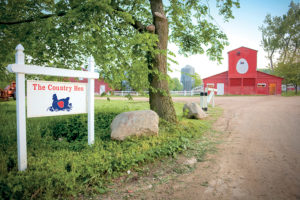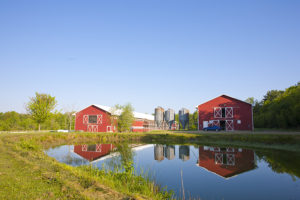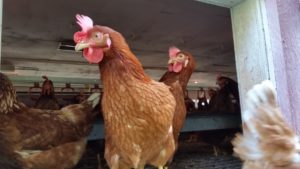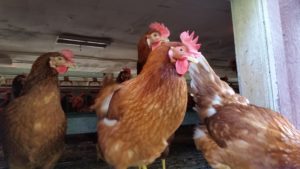– Hubbardston, Massachusetts
 Established in 1987, The Country Hen® farm is located on 35-acres in the small town of Hubbardston, Massachusetts, population 4,500. The farm, which features 105,000 laying hens, is idyllically located between the largest reservoir (Quabbin) in the state and two tracts of forest land managed by the Massachusetts Department of Fish and Game and Wildlife Preservation agencies.
Established in 1987, The Country Hen® farm is located on 35-acres in the small town of Hubbardston, Massachusetts, population 4,500. The farm, which features 105,000 laying hens, is idyllically located between the largest reservoir (Quabbin) in the state and two tracts of forest land managed by the Massachusetts Department of Fish and Game and Wildlife Preservation agencies.
“Our location in this temperate climate zone was most responsible for the breeds of hens we care for – Hyline Brown, Isa Brown, and Bovan Brown hens – who have hardier constitutions that make them better suited to seasonal weather changes,” says Bob Beauregard, General Manager for The Country Hen farm. “Regardless, we still need to provide our hens with heated homes when winter settles in.
Beginning a career in farming
Bob served in the U.S. Navy and worked at a steel plant and a pallet manufacturing plant before landing a job at The Country Hen farm in 1995 as the feed and operations manager. “It was a great fit that allowed me to put my experience with mechanical equipment to rewarding and spiritually fulfilling practical use,” says Bob.
Bob says he learned everything there is to know about caring for laying hens from the farm’s founder, George Bass, who spent a lifetime caring for farm animals. By age nine, George was raising a pig, some piglets, a steer, some turkeys, and laying hens on his family’s property in Bridgeton New Jersey. As an adult, George founded and ran a conventional egg production business called “The Golden Egg” for many years in Bogotá, Columbia. Looking forward to retirement, he sold that business and returned to the U.S.
“But George was never one to sit idle, and before long he decided he missed caring for animals and the farming lifestyle,” says Bob. “He started looking for a small farm to raise hens, and settled on Hubbardston, Massachusetts.”
Before the advent of the internet or social media, George included little notes, now called Farm News inserts, in each carton of eggs. Since 1989, these inserts have educated consumers on what makes The Country Hen farm’s eggs so special and what’s happening on the farm. “These inserts have been so successful, other producers have copied the practice,” says Bob. “That is the highest form of flattery.”
Ensuring the welfare of laying hen
George turned the farm over to Bob in 2003. Bob admits there have been a lot of changes in public perception, certification standards and egg safety regulations since then “that keeps us on our toes,” says Bob. “Cage-Free and Certified Organic egg production is very different and offers many more challenges than conventional production. We strive to meet or exceed the exacting standards for egg safety set down by the FDA, and the standards required to be certified organic through the USDA, and to meet or exceed all rules, regulations and civic responsibilities that are unique to our location.”
For example, Bob says the farm is extra vigilant in preventing contamination of the soil and groundwater from things like nitrogen, phosphorus, Salmonella Enteriditis and other biological contaminants that can be very harmful to human health and the environment. So, they created a manure management program to prevent contamination of the groundwater.
The need to prevent contamination of the water inspired the development of their “porch system,” which provides safe outdoor access for the hens on specially-designed raised, wooden porches. These porches manage the manure safely by virtually eliminating all risk of run-off carrying any contaminants into the public drinking water supply. “The most fundamental basic purpose behind organic farming is and has always been a crusade to preserve natural resources of soil, water and air,” says Bob.
The farm also implements stringent biosecurity measures to preserve the health and well-being of their laying hens. They developed a tiered biosecurity system that not only shelters their hens from exposure to disease but responds to changes in the threat levels that come twice a year with the annual migration of wild waterfowl that are known carriers of Avian Influenza and other devastating diseases.
“In our efforts to ramp up our biosecurity during the Avian Influenza endemic of 2015, we left no stone unturned when exploring ways to keep our ladies safe from their wild waterfowl cousins migrating overhead,” says Bob. “We purchased some coyote decoy manikins to deter waterfowl from coming too close to the man-made pond that serves as a source of water for firefighters to use in the event of a fire. It seemed to be working well enough as we saw no geese or ducks landing near the water after we positioned our artificial “guard dogs.” It turns out that turkeys are a bit more difficult to fool. They decided the decoy coyote manikins were very comfortable places to perch and they sat right on top of them. We had to add a few fake owls, and some Mylar balloons that look like giant eyes to encourage the turkeys to move along elsewhere.”
Meeting Certified Humane Animal Care Standards
The staff inspect the hen’s living environment multiple times each day, monitoring and recording ambient temperature, air quality, feed levels, and water quality. Blood tests are conducted at intervals during the hen’s development, and all of this is reviewed and checked regularly by a veterinarian.
When The Country Hen farm joined the Certified Humane program in 2017, Bob said “the standards and mission of Humane Farm Animal Care (HFAC) might well have been modeled after the practices and procedures we have had in place all along. It certainly is not difficult to comply with HFAC’s Animal Care Standards that were already and had always been standard operating procedures here. The hens are our operation. We rely on them for our livelihood, and without them we’re nothing. Keeping them safe, happy, and healthy is our top priority.”
Another way The Country Hen farm keeps hens healthy and happy is by operating an on-site mill, which combines locally-sourced certified organic ingredients to create a proprietary blend of certified organic feed. The feed formulas designed by George Bass, with the help of specialists in human and animal nutrition working and testing tirelessly for countless hours, are all designed to provide optimum nutrition for their hens at every stage of their development and growth.
“We do not wonder what our girls are eating or drinking, or if they are getting appropriate nutrition,” says Bob.” “We know what they are eating, how old or fresh the feed might be and from whence each ingredient came. We inspect each ingredient and samples are tested at the time of delivery to be sure it is top quality.”
As a result, Bob says their eggs provide all three Omega-3s (DHA, EPA, ALA) and impressive amounts of Vitamin D, Choline, Lutein and Zeaxanthin.
Employing family and local residents to work on the farm
 Because animal husbandry is a top priority for the farm, The Country Hen farm has an intensive hiring process, which involves an extensive background check, drug and alcohol screenings, supervised orientation, hands-on training, regular safety in-services and one-to-one instruction on every aspect of humane hen care.
Because animal husbandry is a top priority for the farm, The Country Hen farm has an intensive hiring process, which involves an extensive background check, drug and alcohol screenings, supervised orientation, hands-on training, regular safety in-services and one-to-one instruction on every aspect of humane hen care.
Some of the farm’s 35 employees are residents, some are family members who work in any capacity as needed. “Nepotism may not be ideal in other types of industry, but it works splendidly on a farm,” says Bob. “Not only do siblings, children, grandchildren and other extended family members tend to jump right in to help each other out when needed, there is also the added benefit or coincidence that all seem to share the same understanding and love of the farming lifestyle and the same compassion for animals.”
As a major employer in Hubbardston, The Country Hen farm has been recognized by the community for numerous contributions and volunteer work. In 2017, Bob himself was the recipient of the town’s prestigious Citizen of the Year award on behalf of the farm’s community service in Hubbardston.
The Country Hen farm eggs are sold in more than 20 states up and down the East Coast and as far west as California. They are sold in cartons of six rather than by the dozen.
Visit Certified Humane’s “Where to Buy” page or download the free Certified Humane app to find stores near you where you can purchase Country Hen Farm eggs and support a Certified Humane farm.
For more information, visit The Country Hen farm.

The Country Hen
Posted: May 4, 2018 by Certified Humane®
– Hubbardston, Massachusetts
“Our location in this temperate climate zone was most responsible for the breeds of hens we care for – Hyline Brown, Isa Brown, and Bovan Brown hens – who have hardier constitutions that make them better suited to seasonal weather changes,” says Bob Beauregard, General Manager for The Country Hen farm. “Regardless, we still need to provide our hens with heated homes when winter settles in.
Beginning a career in farming
Bob served in the U.S. Navy and worked at a steel plant and a pallet manufacturing plant before landing a job at The Country Hen farm in 1995 as the feed and operations manager. “It was a great fit that allowed me to put my experience with mechanical equipment to rewarding and spiritually fulfilling practical use,” says Bob.
Bob says he learned everything there is to know about caring for laying hens from the farm’s founder, George Bass, who spent a lifetime caring for farm animals. By age nine, George was raising a pig, some piglets, a steer, some turkeys, and laying hens on his family’s property in Bridgeton New Jersey. As an adult, George founded and ran a conventional egg production business called “The Golden Egg” for many years in Bogotá, Columbia. Looking forward to retirement, he sold that business and returned to the U.S.
“But George was never one to sit idle, and before long he decided he missed caring for animals and the farming lifestyle,” says Bob. “He started looking for a small farm to raise hens, and settled on Hubbardston, Massachusetts.”
Before the advent of the internet or social media, George included little notes, now called Farm News inserts, in each carton of eggs. Since 1989, these inserts have educated consumers on what makes The Country Hen farm’s eggs so special and what’s happening on the farm. “These inserts have been so successful, other producers have copied the practice,” says Bob. “That is the highest form of flattery.”
Ensuring the welfare of laying hen
George turned the farm over to Bob in 2003. Bob admits there have been a lot of changes in public perception, certification standards and egg safety regulations since then “that keeps us on our toes,” says Bob. “Cage-Free and Certified Organic egg production is very different and offers many more challenges than conventional production. We strive to meet or exceed the exacting standards for egg safety set down by the FDA, and the standards required to be certified organic through the USDA, and to meet or exceed all rules, regulations and civic responsibilities that are unique to our location.”
For example, Bob says the farm is extra vigilant in preventing contamination of the soil and groundwater from things like nitrogen, phosphorus, Salmonella Enteriditis and other biological contaminants that can be very harmful to human health and the environment. So, they created a manure management program to prevent contamination of the groundwater.
The need to prevent contamination of the water inspired the development of their “porch system,” which provides safe outdoor access for the hens on specially-designed raised, wooden porches. These porches manage the manure safely by virtually eliminating all risk of run-off carrying any contaminants into the public drinking water supply. “The most fundamental basic purpose behind organic farming is and has always been a crusade to preserve natural resources of soil, water and air,” says Bob.
The farm also implements stringent biosecurity measures to preserve the health and well-being of their laying hens. They developed a tiered biosecurity system that not only shelters their hens from exposure to disease but responds to changes in the threat levels that come twice a year with the annual migration of wild waterfowl that are known carriers of Avian Influenza and other devastating diseases.
“In our efforts to ramp up our biosecurity during the Avian Influenza endemic of 2015, we left no stone unturned when exploring ways to keep our ladies safe from their wild waterfowl cousins migrating overhead,” says Bob. “We purchased some coyote decoy manikins to deter waterfowl from coming too close to the man-made pond that serves as a source of water for firefighters to use in the event of a fire. It seemed to be working well enough as we saw no geese or ducks landing near the water after we positioned our artificial “guard dogs.” It turns out that turkeys are a bit more difficult to fool. They decided the decoy coyote manikins were very comfortable places to perch and they sat right on top of them. We had to add a few fake owls, and some Mylar balloons that look like giant eyes to encourage the turkeys to move along elsewhere.”
Meeting Certified Humane Animal Care Standards
The staff inspect the hen’s living environment multiple times each day, monitoring and recording ambient temperature, air quality, feed levels, and water quality. Blood tests are conducted at intervals during the hen’s development, and all of this is reviewed and checked regularly by a veterinarian.
When The Country Hen farm joined the Certified Humane program in 2017, Bob said “the standards and mission of Humane Farm Animal Care (HFAC) might well have been modeled after the practices and procedures we have had in place all along. It certainly is not difficult to comply with HFAC’s Animal Care Standards that were already and had always been standard operating procedures here. The hens are our operation. We rely on them for our livelihood, and without them we’re nothing. Keeping them safe, happy, and healthy is our top priority.”
Another way The Country Hen farm keeps hens healthy and happy is by operating an on-site mill, which combines locally-sourced certified organic ingredients to create a proprietary blend of certified organic feed. The feed formulas designed by George Bass, with the help of specialists in human and animal nutrition working and testing tirelessly for countless hours, are all designed to provide optimum nutrition for their hens at every stage of their development and growth.
“We do not wonder what our girls are eating or drinking, or if they are getting appropriate nutrition,” says Bob.” “We know what they are eating, how old or fresh the feed might be and from whence each ingredient came. We inspect each ingredient and samples are tested at the time of delivery to be sure it is top quality.”
As a result, Bob says their eggs provide all three Omega-3s (DHA, EPA, ALA) and impressive amounts of Vitamin D, Choline, Lutein and Zeaxanthin.
Employing family and local residents to work on the farm
Some of the farm’s 35 employees are residents, some are family members who work in any capacity as needed. “Nepotism may not be ideal in other types of industry, but it works splendidly on a farm,” says Bob. “Not only do siblings, children, grandchildren and other extended family members tend to jump right in to help each other out when needed, there is also the added benefit or coincidence that all seem to share the same understanding and love of the farming lifestyle and the same compassion for animals.”
As a major employer in Hubbardston, The Country Hen farm has been recognized by the community for numerous contributions and volunteer work. In 2017, Bob himself was the recipient of the town’s prestigious Citizen of the Year award on behalf of the farm’s community service in Hubbardston.
The Country Hen farm eggs are sold in more than 20 states up and down the East Coast and as far west as California. They are sold in cartons of six rather than by the dozen.
Visit Certified Humane’s “Where to Buy” page or download the free Certified Humane app to find stores near you where you can purchase Country Hen Farm eggs and support a Certified Humane farm.
For more information, visit The Country Hen farm.
Category: bios, Blog